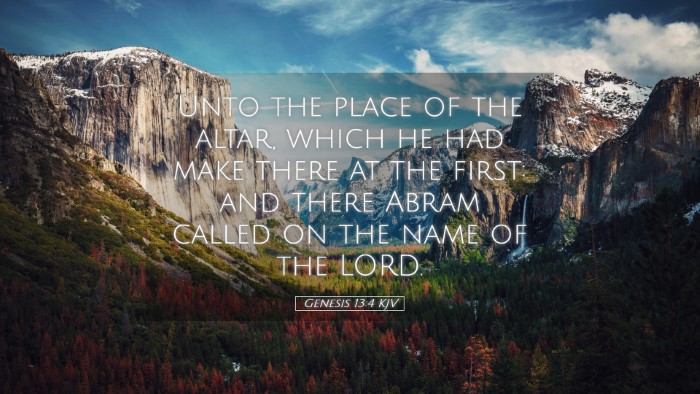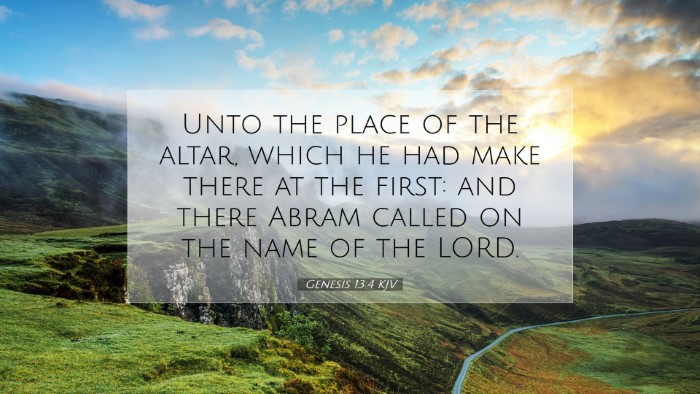Commentary on Genesis 13:4
Bible Verse: "And unto the place of the altar, which he had made there at the first: and there Abram called on the name of the LORD."
Introduction
This verse is a crucial point in the narrative of Abram (later named Abraham), illustrating his deep connection with God through worship and invocation of His name. The return to the altar symbolizes a return to faith and trust in the Lord amidst adversity.
The Significance of the Altar
1. A Place of Worship:
- The altar represents a designated space for communion with God, highlighting the importance of establishing places for worship.
- Matthew Henry notes that Abram’s altar reflects his acknowledgment of God's provision and covenant.
- This act is indicative of Abram’s consistent faith, showing that worship is paramount during both trials and triumphs.
Abram’s Spiritual Journey
2. The Importance of Returning:
- Abram's return to the altar signifies a return to his faith roots during a time of crisis, as indicated by Albert Barnes.
- This act of returning emphasizes repentance and a desire for God’s guidance and presence.
- Adam Clarke emphasizes that this return marks a pivotal moment in recognizing God's past mercies and reaffirming Abram's trust in God's future provisions.
The Role of Prayer
3. Calling on the Name of the LORD:
- The phrase “called on the name of the LORD” symbolizes both prayer and a declaration of faith.
- Matthew Henry explains that Abram’s invocation indicates an earnest plea for God’s favor and guidance.
- It illustrates the necessity of prayer in the believer's life as a means of maintaining a relationship with God.
Theological Implications
4. Covenant Relationship:
- Genesis 13:4 connects to the overarching theme of covenant that runs throughout Genesis.
- Albert Barnes points out that Abram's actions reinforce the idea that God is intimately involved in the lives of those who faithfully serve Him.
- This moment foreshadows the later covenantal promises made to Abram, illustrating the continuity of God’s faithfulness.
Lessons for Today’s Believers
5. Practical Applications:
- Embodying a Spirit of Worship:
- Like Abram, modern believers should establish personal altars or points of worship in their lives.
- This encourages a habit of prayer and reflection on God’s past work, shaping transparency and openness with God.
- Seeking God in Times of Need:
- The narrative encourages believers to return to God in times of difficulty, emphasizing reliance on His guidance.
- Adam Clarke notes that true peace comes from aligning oneself with God’s will.
- Recognizing God’s Presence:
- The acknowledgment of God in all circumstances cultivates a stronger faith and clarity in spiritual direction.
- Abram's actions serve as a reminder to continually invite God's presence into our daily lives through prayer and worship.
Conclusion
Genesis 13:4 encapsulates a profound moment in Abram's spiritual life that resonates with contemporary believers. The return to the altar is a timeless reminder of the importance of worship, prayer, and maintaining a covenant relationship with God. Whether in moments of flourishing or struggle, calling upon the Lord remains essential as we seek to navigate life’s complexities. As we reflect on this passage, may it inspire a deeper commitment to our faith and reliance upon God's unwavering promise.


